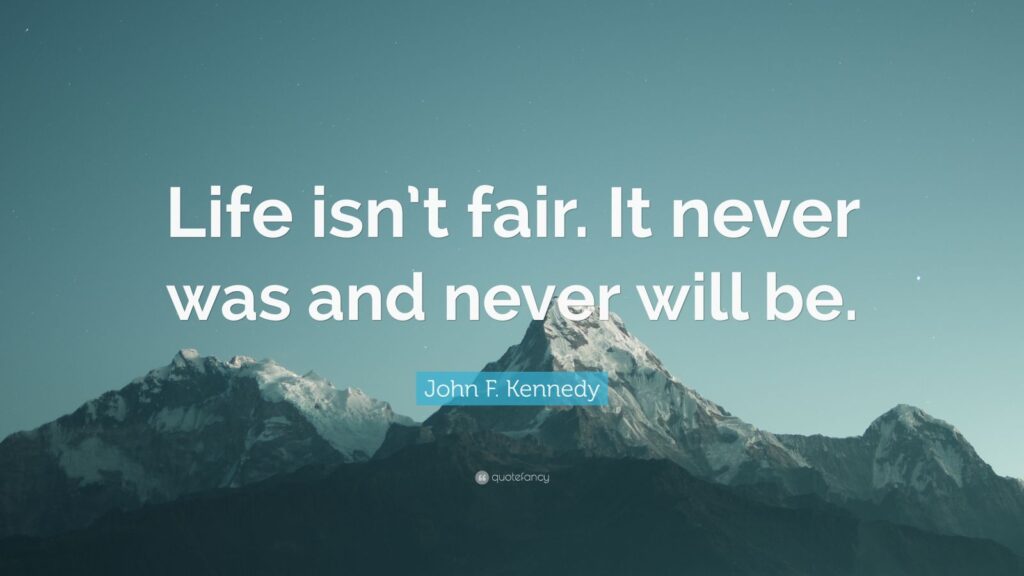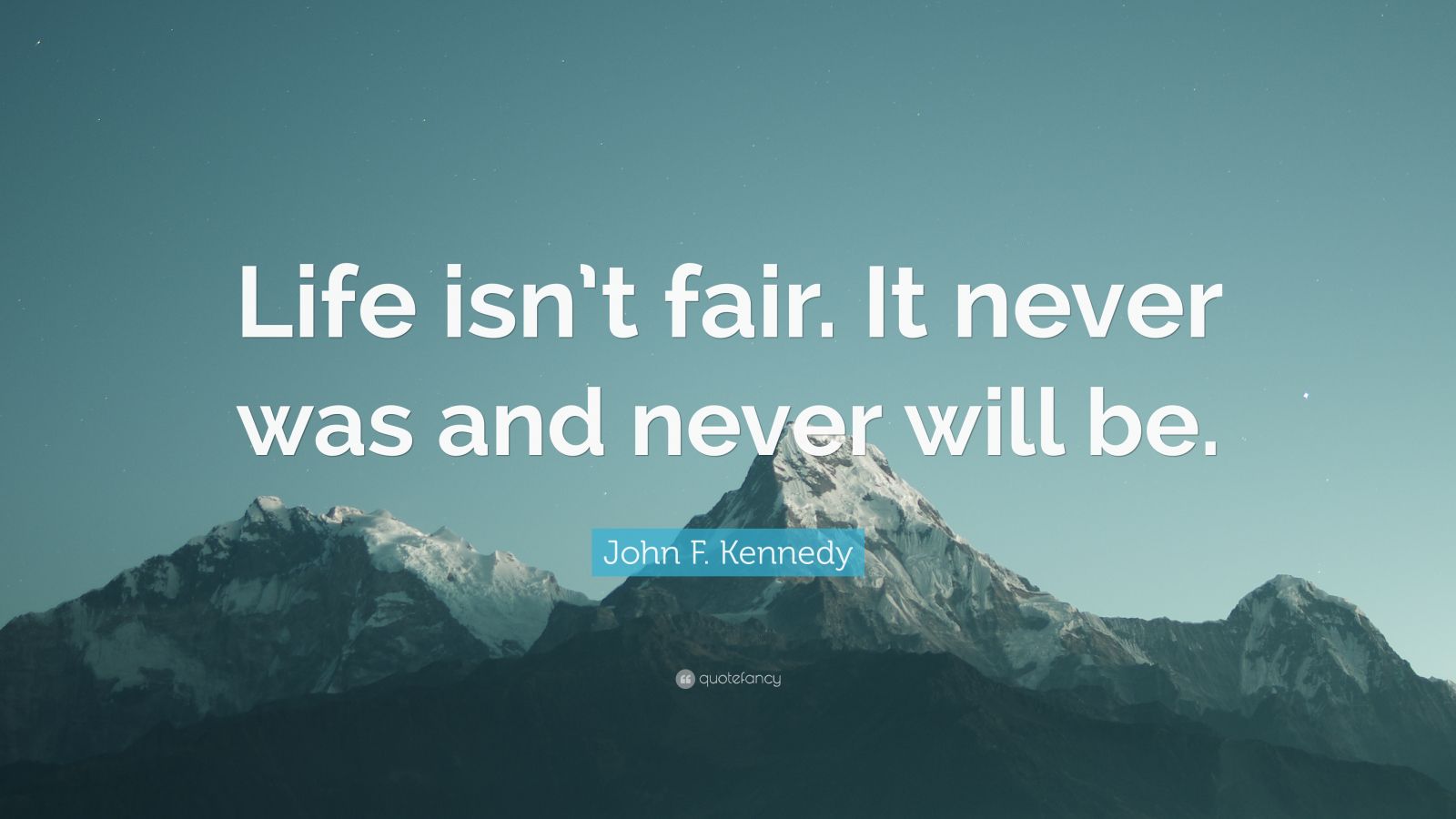
Life Isn’t Fair: Navigating Inequality and Finding Meaning
The phrase “life isn’t fair” is a common lament, often uttered in moments of frustration, disappointment, or perceived injustice. While seemingly simplistic, it encapsulates a profound truth about the human experience. Acknowledging that life isn’t fair is not an invitation to wallow in self-pity, but rather a starting point for developing resilience, empathy, and a proactive approach to navigating the inherent inequalities of the world. This article explores the multifaceted nature of unfairness, its psychological impact, and strategies for finding meaning and purpose despite its pervasive presence. Understanding why life isn’t fair can be a crucial step towards personal growth and societal betterment.
Understanding the Nature of Unfairness
Unfairness manifests in countless ways, ranging from the mundane to the catastrophic. Some are born into privilege, enjoying access to quality education, healthcare, and opportunities, while others face systemic barriers due to their socioeconomic status, race, gender, or geographic location. Accidents, illnesses, and natural disasters strike indiscriminately, often leaving devastation in their wake. Even in seemingly equitable environments, biases and prejudices can create unfair advantages for some and disadvantages for others.
Examining different forms of unfairness helps to contextualize the issue:
- Systemic Inequality: This refers to deeply ingrained biases and discriminatory practices within institutions and societal structures. Examples include unequal access to education, healthcare disparities, and discriminatory hiring practices.
- Random Events: Accidents, illnesses, and natural disasters can disrupt lives and create significant hardship, often without any discernible reason or justification.
- Personal Biases: Unconscious or conscious prejudices can influence decision-making in various contexts, leading to unfair treatment based on factors such as race, gender, religion, or sexual orientation.
- Economic Disparities: The gap between the rich and the poor continues to widen in many parts of the world, creating significant inequalities in access to resources and opportunities.
The Psychological Impact of Perceived Unfairness
Experiencing unfairness can have a significant psychological impact, leading to feelings of anger, resentment, helplessness, and despair. These emotions can manifest in various ways, affecting mental health, relationships, and overall well-being. When individuals feel that they are consistently being treated unfairly, they may develop a sense of cynicism and mistrust, leading to social isolation and disengagement. It’s important to acknowledge that life isn’t fair to avoid becoming disillusioned.
The psychological consequences of perceived unfairness include:
- Increased Stress and Anxiety: Feeling that one is constantly struggling against unfair circumstances can lead to chronic stress and anxiety.
- Depression and Hopelessness: Persistent feelings of injustice can contribute to depression and a sense of hopelessness about the future.
- Anger and Resentment: Unfair treatment can trigger feelings of anger and resentment towards individuals or systems perceived to be responsible.
- Reduced Self-Esteem: Experiencing discrimination or disadvantage can erode self-esteem and confidence.
- Cynicism and Mistrust: Repeated exposure to unfairness can lead to cynicism and a lack of trust in others and in societal institutions.
Strategies for Coping with Unfairness
While it is impossible to eliminate unfairness entirely, there are strategies that individuals can employ to cope with its effects and to find meaning and purpose in the face of adversity. These strategies involve a combination of self-awareness, emotional regulation, and proactive action.
Acknowledge and Validate Your Feelings
The first step in coping with unfairness is to acknowledge and validate your feelings. It is perfectly normal to feel angry, frustrated, or sad when you perceive that you have been treated unfairly. Suppressing these emotions can lead to further psychological distress. Allow yourself to feel what you are feeling without judgment, and seek support from trusted friends, family members, or a therapist if needed. Recognizing that life isn’t fair is the first step to dealing with it.
Practice Self-Compassion
Self-compassion involves treating yourself with the same kindness and understanding that you would offer to a friend who is struggling. When you are facing unfair circumstances, it is important to be gentle with yourself and to avoid self-criticism. Remind yourself that everyone makes mistakes and that you are doing the best you can under difficult circumstances. Practice self-care activities that promote well-being, such as exercise, meditation, or spending time in nature.
Focus on What You Can Control
While you cannot control all the circumstances in your life, you can control your response to them. Focus on what you can do to improve your situation, even if it is only in small ways. Set realistic goals and break them down into manageable steps. Take proactive action to address the challenges you are facing, and celebrate your successes along the way. Remember that life isn’t fair, but you can control how you react to it. [See also: Building Resilience in the Face of Adversity]
Seek Support from Others
Connecting with others who have experienced similar challenges can provide valuable support and perspective. Join a support group, talk to a therapist, or reach out to friends and family members who can offer empathy and understanding. Sharing your experiences with others can help you to feel less alone and to develop new coping strategies. Knowing that life isn’t fair for many people can be comforting.
Advocate for Change
When you witness or experience unfairness, consider taking action to advocate for change. This could involve speaking out against discrimination, supporting organizations that are working to promote equality, or lobbying for policy changes that address systemic inequalities. By working to create a more just and equitable world, you can help to reduce the incidence of unfairness and to create a more positive future for yourself and others. Understanding that life isn’t fair should motivate action.
Develop a Sense of Perspective
While it is important to acknowledge and validate your feelings, it is also helpful to develop a sense of perspective. Try to see the bigger picture and to recognize that everyone faces challenges and setbacks in life. Focus on the things you are grateful for and appreciate the good things in your life. This can help you to maintain a positive outlook and to avoid becoming overwhelmed by negativity. Sometimes, understanding that life isn’t fair requires a broader view.
Finding Meaning and Purpose Despite Unfairness
Even in the face of significant unfairness, it is possible to find meaning and purpose in life. This involves shifting your focus from what you lack to what you can contribute to the world. Consider the following strategies:
- Identify Your Values: What is most important to you in life? What do you stand for? Identifying your values can help you to make decisions and to take actions that are aligned with your beliefs.
- Set Meaningful Goals: What do you want to achieve in your life? Set goals that are challenging but achievable and that are aligned with your values.
- Contribute to Something Larger Than Yourself: Find ways to make a positive impact on the world, whether through volunteering, activism, or simply being kind to others.
- Cultivate Gratitude: Focus on the things you are grateful for in your life, even the small things. This can help you to maintain a positive outlook and to appreciate the good things in your life.
- Practice Mindfulness: Pay attention to the present moment without judgment. This can help you to reduce stress and to appreciate the beauty of the world around you.
Conclusion
The reality that life isn’t fair can be a difficult pill to swallow. However, accepting this truth is not an invitation to despair but rather an opportunity for growth, resilience, and meaningful action. By understanding the nature of unfairness, acknowledging its psychological impact, and developing effective coping strategies, individuals can navigate the inherent inequalities of the world and find purpose and fulfillment. Furthermore, by advocating for change and working to create a more just and equitable society, we can collectively mitigate the effects of unfairness and create a better future for all. Ultimately, understanding that life isn’t fair is the first step towards making it more so.
Learning to accept that life isn’t fair is not easy, but it’s essential for personal growth. Remember to focus on what you can control, seek support, and find meaning in contributing to a better world. Acknowledging that life isn’t fair allows us to build resilience and empathy, becoming stronger and more compassionate individuals. Even when life isn’t fair, we can still strive to make a positive difference.
So, the next time you find yourself thinking, “Life isn’t fair,” remember that you are not alone. It’s a universal experience. But it’s also an opportunity to learn, grow, and make a difference.

